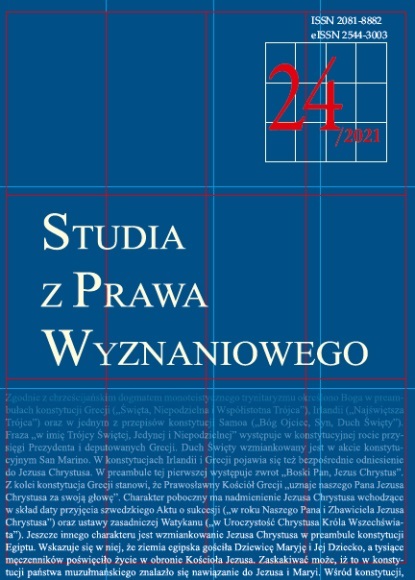Wyjątki od zakazu dyskryminacji ze względu na religię lub przekonania w zatrudnieniu pracowniczym na gruncie art. 4 dyrektywy 2000/78/WE
Exceptions to the prohibition of discrimination on the grounds of religion or belief in employment under Article 4 of Directive 2000/78/EC
Author(s): Łukasz WacławSubject(s): Law, Constitution, Jurisprudence, Human Rights and Humanitarian Law, EU-Legislation, Sociology of Law, Labour and Social Security Law
Published by: Katolicki Uniwersytet Lubelski Jana Pawła II - Wydział Prawa, Prawa Kanonicznego i Administracji
Keywords: prohibition of discrimination; employment; Directive 2000/78/EC; religion or belief;zakaz dyskryminacji; zatrudnienie; religia; przekonania religijne
Summary/Abstract: Equal treatment and the prohibition of discrimination are among the fundamental principles of EU law. This also applies to equal treatment on the grounds of religion or belief in employment. In this area, these values have been secured by Council Directive 2000/78/EC of 27 November 2000, establishing a general framework for equal treatment in employment and occupation. However, the Directive provides for certain exceptions to these general rules. There are circumstances in which the employer’s actions create the appearance of discrimination, but in their essence they do not constitute discrimination. Such a situation occurs when, due to the type of occupational activities or the conditions in which they are carried out, the characteristics related to religion or belief constitute a genuine and determining occupational requirement, and the objective is legitimate and the requirement is proportionate (art. 4 (1)). Such a situation also occurs when, due to the nature or context in which the occupational activities of a church or other organization whose ethos is based on religion or belief are carried out, religion or belief constitute a genuine, legitimate and justified occupational requirement, having regard to the organization’s ethos (art. 4 (2) para. 1). Finally, this is also the case with the requirement of acting in good faith and with loyalty to the organization’s ethos that churches or other organizations whose ethos is based on religion or belief may impose on their employees (art. 4 (2) para. 2). These three situations constitute, as it were, three separate exceptions to the prohibition of discrimination. However, this classification, with which the Author of this study agrees, is not always accepted in jurisprudence and doctrine. Therefore, apart from a detailed analysis of the above-mentioned exceptions to the prohibition of discrimination, the article also presents the existing discrepancies in this matter.
Journal: Studia z Prawa Wyznaniowego
- Issue Year: 2021
- Issue No: 24
- Page Range: 473-493
- Page Count: 21
- Language: Polish

